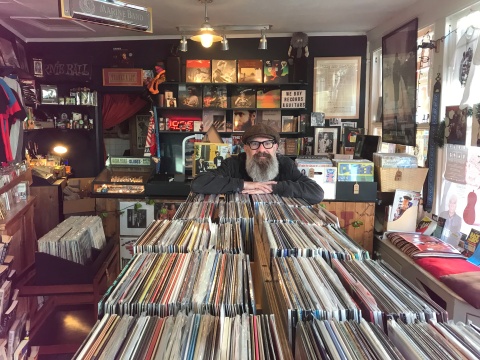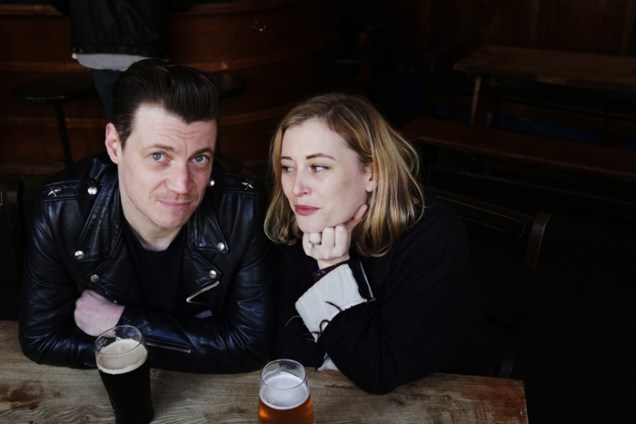
Husband and wife folk-rock duo The Rails – James Walbourne and Kami Thompson – are back. Their much-anticipated second album, Other People, is out on September 1.
Recorded in Nashville and produced by Ray Kennedy [Steve Earle and Lucinda Williams], it’s a darker, heavier and more electric record than their critically acclaimed 2014 debut Fair Warning.
Moving away from the band’s traditional folk roots – it has ‘psychedelic’ tinges and groovy ’60s organ – it’s an album of 10 self-penned songs and isn’t afraid to speak its mind and deal with modern social issues.
The title track is a rallying call against those who are out for themselves, while Brick and Mortar is an angry protest song that laments the death of London – it’s part funeral march, part Kinks.
The album feels like a record that’s about people who aren’t at ease with the world in which they live…
I took James [guitars, vocals, keyboards] and Kami [vocals and guitar] down the pub to find out more…
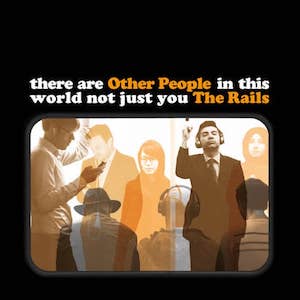
Q & A
You recorded the new album in Nashville, at Room & Board Studio, with producer Ray Kennedy, who’s worked with acts including Steve Earle and Lucinda Williams. Why did you decide to make the new album in Nashville?
James: It was because Ray was there – I just wanted to work with Ray. Nashville had no bearing or influence on the record in any way.
You haven’t made a ‘Nashville country album,’ have you?
James: It honestly had nothing to do with country – it was cheaper to make the record with Ray in Nashville than to fly him over to the UK. We didn’t see any of Nashville. We got there, we drove to a house where we were staying and then to the studio – and that’s what we did for about a week. It was bloody hard work.
Kami: It was quite stressful – we had a small budget and very little time.
Why did you want to work with Ray Kennedy?
James: We were struggling with whom we were going to get to produce it, as we wanted to do something different, and then he came to mind. One morning, I thought, ‘It would be great if Ray could do it’…
Ray had worked on a 1998 album called Domestic Blues by my friend Bap Kennedy – I spoke to Bap about him – and then Ray Davies also said that I should work with Ray. It all came together. Ray Kennedy is a genius…
And so is Ray Davies…
James: He is! Ray Kennedy had also worked on some of my favourite records, like Steve Earle’s Transcendental Blues, which sounds heavy. We wanted to do a heavier record that was less folky. We wanted this album to be more of a rock band approach – more of a psychedelic thing. Maybe ‘psychedelic’ is too much… we wanted a whittled-down approach, with two electric guitars, bass and keyboards. We didn’t want any fiddles on it…
Kami: Or sailors.
James: If you’re in Nashville, you’ve got to watch the fiddle because it then becomes a country fiddle…
There is a pedal steel guitar on the album…
James: Yes – Eric Heyward played on one track.
‘We wanted to do a heavier record that was less folky – more of a rock band approach’
Can you tell me about the musicians you worked with on the new album? They weren’t Nashville guys, were they?
James: It’s funny – I knew we were going to get asked about the Nashville thing, but everyone that was involved – apart from Ray – wasn’t from Nashville. Cody Dickinson was on our first record – he’s the drummer in the North Mississippi Allstars and he lives in Memphis – he’s an old friend, so it was a no-brainer.
Jim Boquist [on bass] is another old friend of mine and he was in the first incarnation of Son Volt – he’s from Minneapolis. He has a punk-rock edge, ‘cos he used to hang out with The Replacements – he’s a good friend of Paul Westerberg’s. We had a different mix of people – from Memphis to Minneapolis is a huge world away and then there was us with the English folk thing…. we wanted to see what it would sound like.
Your first album was recorded in London with Edwyn Collins as producer. How was it working with Ray on this album? How did it compare?
James: It was as bonkers – they’re both as bonkers as each other.
Kami: It was a whole different substrata of bonkers…
James: They’re both in analogue mode – everything’s old and analogue…. This time [in Nashville], there were compressors that were used at MGM for Hank Williams and there were thousands of guitars – it was amazing.
Kami: You couldn’t let your gaze rest on anything for too long, because Ray would say, ‘Are you looking at that compressor? That’s the compressor that The Beatles used…’
Let’s talk about some of the songs on the new album.
You’ve said that this record is a move away from the more traditional folk sound of your debut, but there’s still a folk feel to some of the tracks, particularly the opening song The Cally and the title track and first single, Other People…
James: Yes – that’s true.
Other People has a pretty, folk-pop melody, but, lyrically it’s quite an angry song, isn’t it?
James: (laughing) I keep hearing that from people – I didn’t mean it to be that angry!
The opening line is, ‘crazy people, money-grabbers, old religions and new regimes, back-stabbers, heart-breakers, psychopaths with evil schemes….’
It sounds to me like a comment on the state of the world – a rallying call against selfish people and those who are just using others to further their own means…
James: It started with me being pissed off about people who should get off their high horse. It’s when you walk down the street…
Kami: It’s that huge lack of social manners.
James: It seems to be everywhere now. It’s about the internet and all the other stuff – it’s this (he points to his mobile phone) all the time…
But the song feels like it’s about bigger issues…
James: It grew into that – it got angrier and angrier as we were writing it. It’s a selfish world… I get the feeling that everyone’s out for themselves – they should care about their fellow man a little more.
Kami: It’s a theme on which you can easily zoom in and out.
It’s got a gorgeous tune, though…
James: You’ve got to be able to whistle it – you can’t give it all away.
‘There’s more of ourselves in this album… It definitely feels darker, but it wasn’t intentional’
It’s lighter than some of the other songs on the album, which I think is a very dark record, lyrically…
James: I guess it is.
It’s darker than the first album…
James: There’s more of ourselves in this album… It definitely feels darker, but it wasn’t intentional.
Kami: I can’t remember the last time either of us wrote a particularly cheerful song.
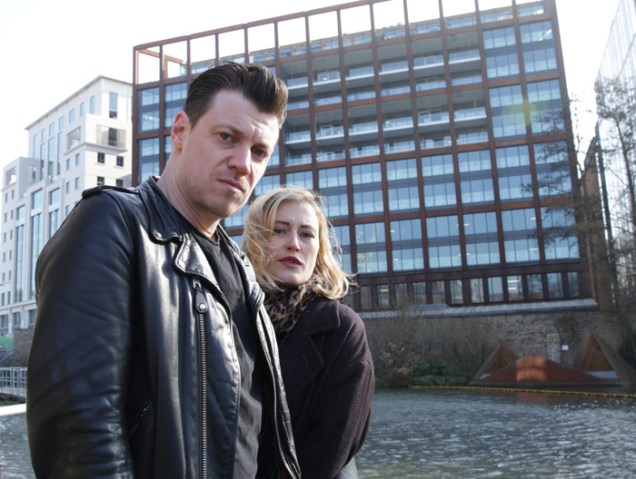
I think there are recurring themes on the record – the title track, Late Surrender, Leaving The Land and Brick and Mortar all seem to be songs about people who aren’t at ease with the world in which they live…
Kami: That’s a good way of summing it up.
There’s a line in the song Other People that seems to sum up the whole record for me – ‘we’re all strangers in our own time.’ Have the songs been shaped by current political and social issues?
Kami: Yes – absolutely. A lot of the album was written at a time when we were going to have to move out of London because we couldn’t afford to buy somewhere to live, so that was playing on our minds. And also maybe it’s the age we are – I think that plays a part. The song Leaving The Land was written about thinking we would have to leave London.
The album’s opening song, The Cally, is one of the more folky songs on the record. It’s about the characters who lived and worked on Caledonian Road in North London and it also mentions Pentonville Prison.
You like a prison song, don’t you? You had two on your first album – Send Her To Holloway and Borstal…
James: We love a prison song!
What was the inspiration for The Cally?
James: It was all down to my granddad, whose flat we’re now living in. He died a couple of years ago – he was 92. One day, we were in the kitchen and he was talking to me about when he lived and grew up around ‘The Cally’ and Almeida Street in Islington.
He liked to talk about the old days – he was telling me about a woman called ‘Woodbine Nellie’ who used to ‘work’ on the street. She was a lady of the night and I thought, ‘that’s a good name’.
I was walking down Caledonian Road one day and I started humming a song and I wrote it when I got home – I did it really quickly.
After The Cally, the next song on the record is Late Surrender. James – musically, it reminds me of some of the tracks you’ve played on with Pete Bruntnell… [James has been a guitarist for several acts, including UK singer-songwriter Pete Bruntnell, Ray Davies, Son Volt, The Pernice Brothers, The Pogues and The Pretenders – he’s in the current Pretenders line-up]
It has a kind of Americana feel and jangly guitars…
James: Yes – it’s more rock. I can’t stand the term ‘Americana’ – I’ve never liked it.
Kami: I’m fairly allergic to the term ‘Americana’. It’s just English people playing American music – and, most of the time, quite badly.
Drowned In Blue and Hanging On are both melancholy songs – the former has a country feel to it, which is down to the pedal steel guitar.Was that a little bit of Nashville rubbing off on you?
James: It was – we thought we’d better give it a nod and Eric [Heyward] was in town. He’d been up all night, drinking moonshine with Tony Joe White’s drummer and they both rolled in… but he played amazing. He’s one of the best – a pedal steel stylist. No one else sounds like that guy.
Drowned In Blue has some psychedelic moments on it, too…
James: Exactly. We wanted to do what Ray Kennedy had done on those Steve Earle records – suddenly go from country to a Beatles thing. It’s like ‘what the fuck?’ It’s different from the folk thing. I wanted him to do his thing and put his stamp on it.
Kami: With our first album, we set out to make a folk-rock record with a ‘70s vibe, but an updated version of it. The first record was more of a concept – we had an idea and we worked towards making that happen. We wrote a few songs for it that were in that vein and we arranged some traditional songs in that style. With the new album, we wanted to make a heavier record – it felt more natural to us and it’s more of a reflection of the things that we like to listen to. We don’t listen to any folk music.
‘I’m fairly allergic to the term ‘Americana’. It’s just English people playing American music – and, most of the time, quite badly’
So do you feel like you’ve been tarred with the folk brush?
James: Not now, because we’ve got the new album…
Is folk a dirty word?
Kami: Not at all… I just hate anything that hasn’t got balls – I like things to have a bit of grit.
James: That’s what it’s about. It doesn’t matter whether it’s folk, or rock… we just wanted to make some great songs that had some grit. We wanted to sound heavier and for it to be electrified.
Drowned In Blue and Hanging On both seem to share a common theme – they’re songs about people who are at the end of their tether… maybe even suicidal…
Kami: James is regularly at the end of his tether!
James: That’s how I feel constantly! It’s funny talking about the themes of the songs because I hadn’t given it that much thought – I didn’t think about how dark it was. You’re right.
Kami: James is more the homicidal side of our marriage – I’m more suicidal! We should get some-T shirts made…
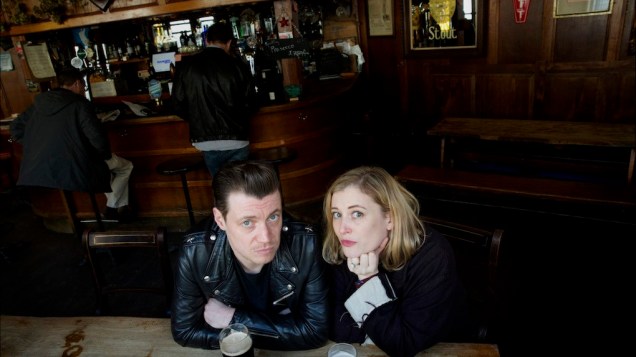
We’re talking about how dark the album is – there’s actually a song on it called Dark Times. It’s about an abusive relationship…
James: Yes – it’s another abusive relationship song. It’s meant to be like one of those old ‘60s songs – a Dan Penn-type song. It’s Dann Penn-lite.
And it ends with some groovy ‘60s organ….
James: Organs are hip! It was meant to be like Cream doing a folk song.
Brick and Mortar is my favourite song on the album.
Kami: Mine, too.
It deals with how old London is being torn down by greedy property developers and it laments what’s happened to some of the old pubs, areas like Soho and famous places like Denmark Street – Tin Pan Alley…
Kami: It’s the rich taking over the world…
It’s a song about the death of London and, appropriately, it’s a kind of funeral march…
James: It really is – a very fast one.
And it reminds me of The Kinks….
James: It is a bit Kinks-y, but it started out as slow and acoustic – like something from Oliver.
Brick and Mortar is a protest song – in fact several of the songs on the album could be seen as ‘protest songs’, couldn’t they?
Kami: I think the whole album is a rant!
James: It does feel like more of a rant…
Let’s talk about your songwriting process? Do you write together or separately?
Kami: For the most part, we write separately, but James will finish a middle eight or a chorus for me and I’ll write some lyrics for him – or vice versa. We tend to each have written most of the song before the other person gets involved.
James: The songs are mostly written – it’s just tweaking.
Kami: There’s only one of my songs on the new album – Leaving The Land. James had written loads and by the time I went to put my songs into the ring, they weren’t really in the same vein.
James: I wrote furiously for a long time…
‘I think the whole album is a rant!’
What music are you listening to at the moment?
James: I like the new albums by Jason Isbell and Randy Newman. The Randy Newman album is called Dark Matter and it’s bonkers – I listened to it in the bath last night. It’s pushing the boundaries – it’s mental. I’ve been listening to the Elvis album A Boy From Tupelo – it’s his early recordings re-mastered.
Kami: I’m having a funny couple of weeks. Do you ever get those weeks when you’re allergic to music? Nothing’s right.
The other day I went through every record that I thought I might want to listen to and I ended up listening to Radio 4. Maybe it’s because we’re gearing up to tour and I’m learning songs. I think my brain’s full.
Is there anyone you’d like to collaborate with?
James: That’s an interesting question. A lot of them are dead!
Kami: A palate cleanser for myself would be a non-collaboration – just to quietly do my own thing.
James: I think that’s true for both of us – I think I’m going to do it as well.
What are the pros and cons of being a married couple in a band? Is it hard?
James: Yes – you never want to do any work!
Kami: It’s very difficult to carve out time to work.
James: We have real arguments about it– we’ve got very different views on music and everything….
Kami: Music is all James does, but I go into a non-music mode between records – I sometimes have to switch that mode back on.
James: This year I haven’t stopped working – we’ve done the album, the rest of the year is solid and we’ve got stuff lined up for next year – we’re doing another Rails tour and there’s Pretenders stuff on the go. I’ve written a few songs with Chrissie Hynde and there’s a Pretenders live album coming out in a couple of months.
You’re heading out on a nine-day UK tour in September and then you’re supporting The Pretenders after that. What can we expect?
Kami: It’s stripped down – a four-piece band.
James: It’s two electric guitars, bass and drums.
James – you’ll be playing guitar in The Pretenders, too. How do you feel about supporting yourself on tour?
James: It’s not ideal… It will be a long time, but we needed to do it. Chrissie Hynde loves us – thank God – and she’s very vocal about us.
Kami: It will be like when A Mighty Wind opened up for Spinal Tap!
James: I might have a costume change…
So what’s a typical Rails tour like? Is it rock and roll?
James: Rock and roll? There aren’t many tours that are rock and roll anymore…
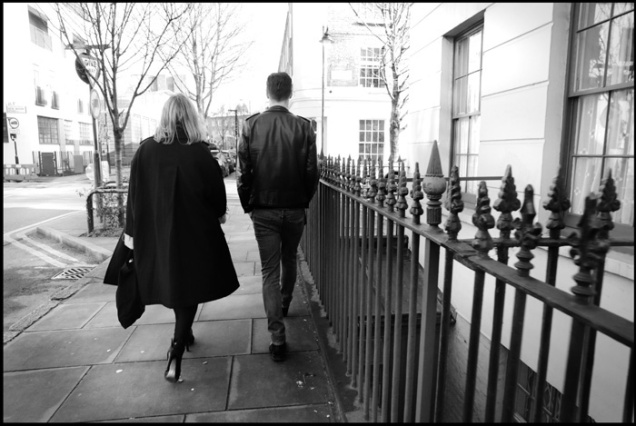
Other People – the new album by The Rails – is released on September 1 on Sony / Red Essential.
The Rails are touring the UK in September:
September 11 – Glasgow, King Tuts Wah Wah Hut
Tues 12 – Leicester, The Musician
Tue 13 – Hull, The Adelphi
Thurs 14 – Hedben Bridge, The Trades Club
Fri 15 – Manchester, The Deaf Institute
Mon 18 – Cambridge, Junction 2
Tues 19 – Norwich, Arts Centre
Wed 20 – London, The Borderline
Thurs 21 – Newbury, Arlington Arts Centre
http://www.therailsofficial.com/
